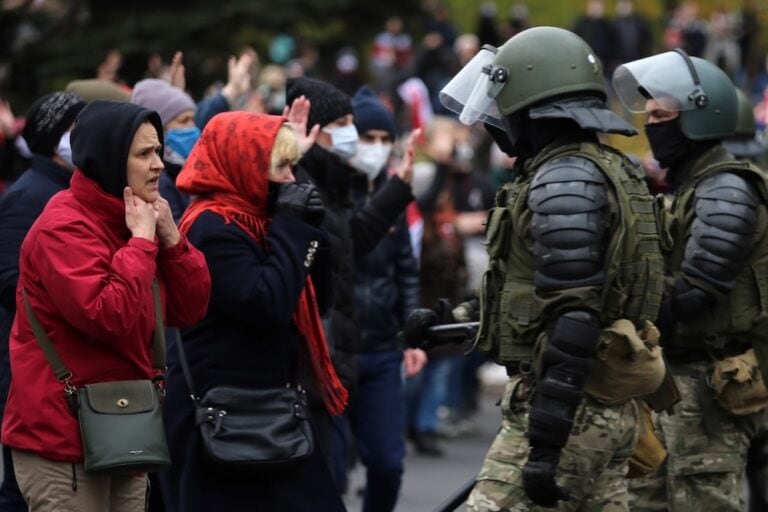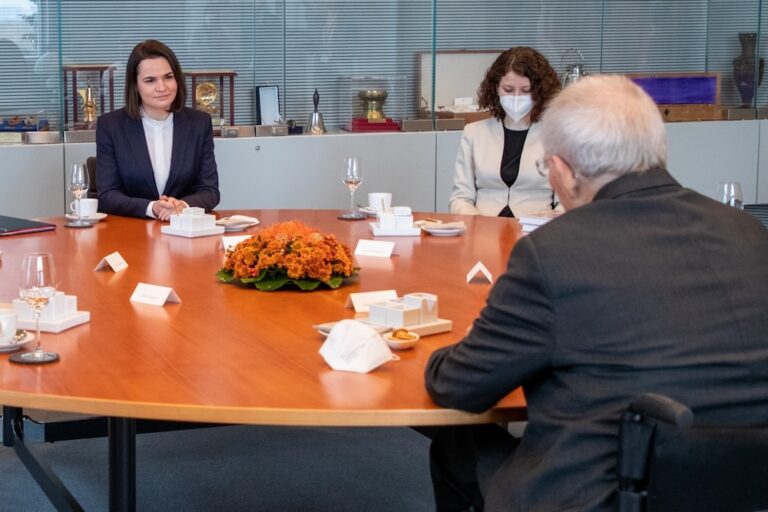From May to July, police arrested at least 1,100 people during peaceful demonstrations. Courts sentenced nearly 200 people to detention for up to 15 days, with some sentenced to multiple terms. They fined more than 300 others.
This statement was originally published on hrw.org on 30 July 2020.
Police in Belarus have arbitrarily arrested journalists, bloggers, and political activists ahead of the August 9, 2020 presidential election and pressed charges against two potential candidates, Human Rights Watch said today.
The arrests raise concerns about interference with and violations of rights to freedom of expression, particularly media freedom and political speech, and freedom of assembly. Many of the arrests seemed timed to keep those detained locked away until at least after the elections.
“Belarusian authorities are using flimsy pretexts to silence journalists and critics, which should never happen, but that has even more damning consequences for citizens’ rights in an election period,” said Hugh Williamson, Europe and Central Asia director at Human Rights Watch. “The international community should not ignore such serious flouting of human rights obligations.”
On July 15, the Office for Democratic Institutions and Human Rights of the Organization for Security and Cooperation in Europe (OSCE), which methodically monitors elections in the region, stated that for the first time, it would not monitor the vote, citing the authorities’ failure to deliver a timely invitation.
The authorities pressed criminal charges against two opposition presidential hopefuls, one of them a top candidate, and refused to register the candidacy of another top candidate. From May through July, police arrested at least 1,100 people for gathering peacefully on issues related to the election. Courts sentenced nearly 200 people to detention for up to 15 days, with some sentenced to multiple terms. They fined more than 300 others.
Police arrested journalists and bloggers as they were reporting from peaceful public gatherings, in some cases using excessive force. Human Rights Watch interviewed several journalists after their release. Some were released shortly afterward without charges. Others were charged for participation in unsanctioned public gatherings and/or resisting police orders and were fined by courts, despite their assertions that they were covering the events on assignment. Some said the police beat them.
On July 16, police arrested Viktar Babaryka, who had gathered a record number of signatures supporting his presidential candidacy. They also arrested Babaryka’s son, Eduard, who was his father’s campaign manager. The Babarykas are in pretrial custody, facing charges that include tax evasion.
Siarhei Tsikhanouski, a blogger who had intended to run for president, is also being held. After police arrested him several times on misdemeanor pretexts, Tsikhanouski’s wife, Sviatlana, announced she would run for president, and Siarhei became her campaign manager.
But on May 29, police arrested Siarhei Tsikhanouski in Hrodna, when he and other activists were gathering signatures for his wife’s candidacy. Two unidentified women attempted unsuccessfully to pick a fight with Tsikhanouski. When police officers rushed in, one officer fell to the ground. Although videos of the event show that he was not hit or pushed, the authorities claim he was injured. They opened a criminal investigation into “organizing group actions that grossly violate public order” and violence against the police.
The authorities have turned the events in Hrodna into a large criminal case alleging mass joint criminal behavior and have since detained 18 other bloggers and political activists in the case. Sixteen, including Tsihanouski, are in pretrial custody. If convicted, they face up to three years in prison.
Police arrested one of the activists, Siarhei Sparysh, while he was self-isolating at home because he had been in contact with a confirmed Covid-19 patient. Locking him up while he was self-isolating risked recklessly exposing other people to Covid-19, Human Rights Watch said.
On July 30, authorities announced they opened new criminal charges against Tsikhanouski and another opposition politician, Mikolai Statkevich, on “preparation for mass riots.” They also opened a new investigation against Tshihanouski on charges of incitement to violence against police.
Valer Tsapkala, Belarussian ambassador to the United States from 1997 to 2002, had also sought to run for president, but the Central Election Commission (CEC) refused to register his candidacy, claiming that over 50 percent of the 160,000 signatures he had gathered were invalid.
Belarus’s CEC did confirm Sviatlana Tsikhanouskaya’s candidacy on July 17, and she is now backed by campaigns of both Babaryka and Tsapkala. In July, citing telephone threats, Tsikhanouskaya sent her children abroad for their safety. Tsapkala left Belarus with his children, also citing concerns for their safety.
Other candidates, in addition to Alexander Lukashenka, Belarus’s president since 1994, are Andrei Dzmitrieu, of the opposition Tell the Truth movement; Anna Kanopatskaya, who until 2019 was a member of parliament, one of two independent members; and Siarhei Cherechen, a young businessman and leader of the Social Democratic Party.
From May through mid-July, police detained people who gathered peacefully in a variety of settings and arrested and beat journalists covering these events. Some of these events were to collect signatures for presidential hopefuls. Although Belarusian election law allows such gatherings, law enforcement deemed them unsanctioned assemblies. At least 195 people were detained at these events from May 6 through 31 alone.
On July 15, hundreds in Minsk lined up to file complaints about the CEC’s refusal to register opposition candidates. After 7 p.m., police started arresting participants. Police violently detained Anton Trafimovich, a reporter with Radio Free Europe/Radio Liberty (RFE/RL) covering the event, breaking his nose. Trafimovich told Human Rights Watch that the authorities are pressing charges against him, most likely to justify injuring him.After news of the arrests and beatings of protesters and journalists spread, Lukashenka called on his cabinet to expel foreign journalists, contending that they are biased and falsely stating that they have called for “mass disturbances.” In June, Lukashenka accused Telegram social media channels of spreading “fake news” and inciting public protests. Interior Minister Yuri Karaeu told Parliament that these “people are … attempting to make a street revolution.”
Belarusian authorities should respect freedom of expression and assembly, Human Rights Watch said. Belarus has an obligation under international law not to unduly prevent journalists from doing their job, including reporting on unsanctioned protests. Under international law, everyone has a right to take part in peaceful assemblies, assemblies should be presumed lawful, and nobody should be punished for participating in a peaceful protest, even if the authorities deem it unlawful. Journalists should be allowed to cover these events without undue police interference.
The European Union and its member states, the United Nations, and other bodies should closely monitor developments in Belarus and stand ready to call out abuse in the lead up and aftermath of the vote, Human Rights Watch said.
“Election periods should be a time when governments scrupulously respect political rights, including freedoms of expression and assembly,” Williamson said. “Sadly, this has not been the case in Belarus. Belarus’s leaders should know that the international community will take notice.”
For additional details and accounts of arrests and abuse, please refer to HRW’s statement.



